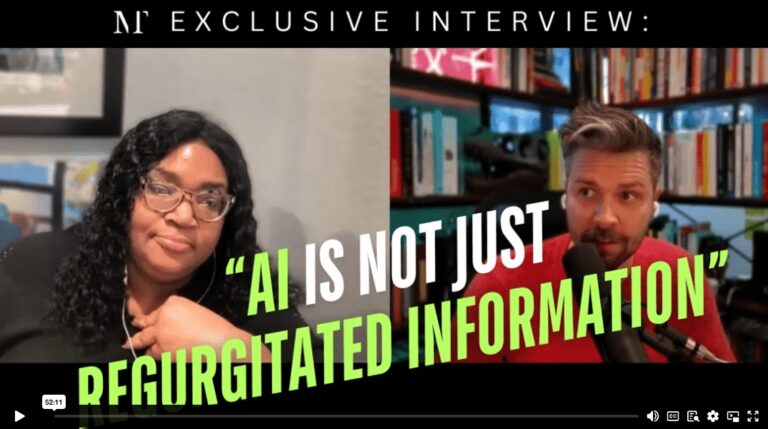
She’s Helping People Transform Their Untold Stories And Experiences Into Published Books
Sitting on a powerful story that could change lives, but don’t know how to get it out of your head and into the hands of
Struggling to get your clients the results they need through your agency …
Imagine having the power to turn a single, groundbreaking idea into a …
Enhancing Storytelling with AI: Crafting Compelling Narratives with Advanced Prompts Yes, Artificial …
Struggling to get your clients the results they need through your agency …
Imagine having the power to turn a single, groundbreaking idea into a …
Enhancing Storytelling with AI: Crafting Compelling Narratives with Advanced Prompts Yes, Artificial …
The digital age has always been a peculiarly double-edged sword for authors, nestled at the intersection of innovation and preservation. In his recent piece in The Atlatic, Ian Bogost dives into the divisive matter of Meta using literary content to train its generative AI models, exploring the philosophical debate about authorship and the broader implications of AI’s role in society. Enter MovableType.ai, a platform that arguably democratizes writing and enables anyone to put pen to paper—or, more aptly, fingers to keyboard.
“The future promised by AI is written with stolen words,” remarks novelist Lauren Groff in the context of her novels being included in Meta’s large language model training set. But what are ‘stolen words’ in a time where vast streams of data flow freely, where the very definition of intellectual property wavers? We live in a time where the line between theft and homage, inspiration and appropriation, has blurred considerably.
Many authors reacted with visceral aversion to learning their work was utilized by Meta without explicit permission. When viewed through the lens of MovableType.ai, the concept takes on a different hue. MovableType is a testament to the fact that the act of writing transcends traditional gatekeeping. If writing is an act of sharing ideas, stories, and experiences with the world, then platforms like these further that goal by making the act of writing accessible to all.
The philosopher Jacques Derrida, as Bogost notes, speaks of “dissemination”, positing that once an author’s work is in the wild, its interpretation and utility become organic, evolving in the hands and minds of readers and users. This decentralization of authority over a piece, though potentially disconcerting for some writers, is a hallmark of digital innovation. MovableType.ai, in its essence, is a celebration of this very principle. It’s a tool, a canvas, that allows for the “dissemination” of writing from countless voices, all the while maintaining an implicit understanding that the ideas behind the words that trained the model aren’t as important as the means in which they are used to help articulate new ideas.
Bogost touches upon the moral intricacies of “permission” in the digital era. With the online sphere being a breeding ground for interpretations, feedback, and real-time critique, the ownership of a narrative becomes more fluid. This very fluidity is at the core of MovableType’s ethos. While it respects the sanctity of authorship, it also champions the adaptability of narratives and the democratization of writing.
Bogost amusingly contemplates the idea of Meta “stealing” his life, challenging the gravity we often attach to authorship. He astutely points out that while the literary world might prioritize published works over Amazon reviews or subreddit posts, in the grand landscape of digital data, all content assumes a certain democratic equality. Here, MovableType.ai emerges as a great leveller, facilitating both the experienced author and the amateur hobbyist, and reminding us that in the digital age, every voice has value.
The ending of Bogost’s piece, a reflection on why one becomes an author, struck a chord. If writing is about the “experimentation with ideas,” then platforms like MovableType.ai are the laboratories of the future. They’re spaces that empower individuals to craft, mold, and reshape narratives, irrespective of their background. It underscores the fact that while AI and the digital sphere might reshape the contours of authorship, the essence of storytelling remains unchanged.
In the end, as we grapple with the complexities of AI’s role in authorship, perhaps we ought to take a leaf out of Bogost’s book. If authorship is about vanity, then let machines exit the conversation entirely. But if it’s about the sheer love of storytelling and the insatiable desire to share ideas, then platforms like MovableType.ai are more relevant now than ever before. They don’t replace authors; they elevate them. They remind us that in this vast digital landscape, there’s room for every story and every voice.

Sitting on a powerful story that could change lives, but don’t know how to get it out of your head and into the hands of

Struggling to get your clients the results they need through your agency or consulting business? Ever feel like you’re constantly fighting an uphill battle, trying

Imagine having the power to turn a single, groundbreaking idea into a fully-formed non-fiction book manuscript of over 30,000 words – all with the help

Enhancing Storytelling with AI: Crafting Compelling Narratives with Advanced Prompts Yes, Artificial Intelligence (AI) can significantly enhance storytelling by infusing creativity, preserving cultural narratives, and

Turn your existing book outline into a structured project with MovableType! This video shows you how to leverage your hard work developing an outline into

In this Loom, I walk you through the process of adding a table of contents in a Word document. I demonstrate two approaches: one with